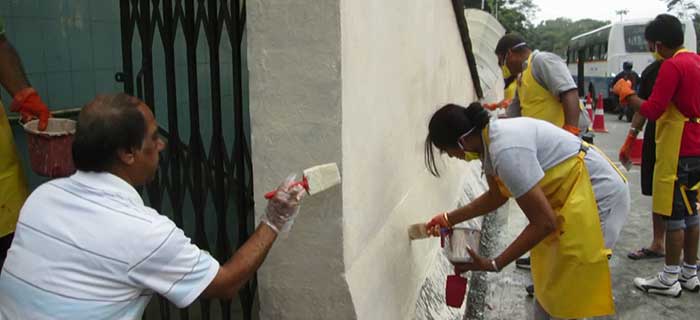There’s An Anonymous Revolution Going On In India. And Here’s What They Are Doing.
We featured the inspiring work by The Ugly Indians way back in March 2014. Since then, common people like you and I have started making efforts to imitate the same in our own cities. And an anonymous revolution took shape that is still spreading across India.
This talk by an anonymous member of The Ugly Indians truly depicts the triumph of the common man: how ‘kaam chalu, mooh bandh’ always work.
A few highlights from the awe-inspiring video:
Why do we keep our houses clean, and our streets dirty? 🔗

The problem is we believe that it’s not my problem.
Wherever we go, we tend to spread filth 🔗

That’s Little India, Singapore, a city that cares about its brand image, enforce laws, and is affluent. Still, Indians have managed to spoil it.
We are a society that doesn’t like to follow rules 🔗

Why do we need a policeman when we have a traffic light? Because we don’t follow rules.
The Broken Windows Theory & Tragedy of the Commons 🔗

Broken windows theory – If a place is ugly, it becomes uglier. If a place is beautiful, it commands respect.
Tragedy of the Commons – We care for our private spaces, but we don’t care about public spaces.
India is a perfect example of both.
So what’s the solution? Kaam chalu, mooh bandh 🔗

Fixing places of filth through community powered initiative. With as less than Rs. 300, a group of 3 can easily fix a filthy spot in their own neighborhood in a couple of hours. And the best part: it stays clean because of the broken windows theory. (Refer to point #4 above)
Why stay anonymous? 🔗

Because the problem in India is that we make judgments on people and not the work they do. It’s irrelevant if you’re a male, female, Hindu, Muslim, straight, gay, or what your political affiliations are. The focus should be only on results.
The Most Awesome part of the whole video: Walk the Talk 🔗

The best part of the video is towards the end when the speaker actually walks the talk: when he has spent 18 minutes delivering only a speech (mooh chalana), where’s the work (kaam chalu?). So he visited the auditorium 2 days before the scheduled talk & actually fixed a neglected footpath around the boundary wall. They also fixed an open electricity box just outside the venue.
And that inspired the mayor of Bangalore & TED audience to join the revolution 🔗

Stop being an ugly Indian. And be a part of the solution.
Why is India so filthy? | The Ugly Indian | TEDxBangalore | Video (17:33 minutes) 🔗
This talk was given at a local TEDx event, produced independently of the TED Conferences. The Ugly Indian is an anonymous collective that does not talk to media, wants no publicity and works with the motto - Only Work No Talk. However, they made an exception for TEDxBangalore so that they could open up the question of why we as Indians are okay with filthy public spaces? The tragedy of the commons - can we change it to the victory of the commons?
There’s a silent revolution brewing in India, and it’s called The Ugly Indian. It is anonymous, faceless and leaderless, and has seen thousands of citizens coming out to fix local civic problems following a simple motto: Kaam Chalu Mooh Bandh. Only Work No Talk. What started off as a series of social experiments in Bangalore in 2011, to see what it takes to change everyday ugly Indian behavior in public spaces (littering, spitting paan, public urination and more), has now transformed into a nation-wide movement that is spreading virally – both on social media, and on the ground. The centerpiece of the TUI approach is the ‘spotfix’ where ugly spots are ‘fixed’ by citizens. There is no activism, no sloganeering, no lecturing, no finger-pointing and no ideological debates – just a sincere attempt to solve problems by focusing on a spot - using one’s own time, hands and money.

